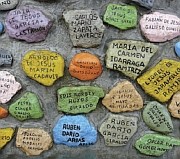Memory initiatives on the conflict and political violence are proliferating throughout Colombia. At the local, regional, and state level, organizers have developed initiatives like the Never Again Salon and the March of Light in Antioquia, as well as dozens of plays, documentaries, and innumerable ceremonies both to commemorate and educate about the past.
The state, for its part, has contributed to establishing and preserving the memory of the conflict in Colombia through reports drawn up by the Group for Historical Memory and the National Commission for Reparation and Reconciliation.
In addition, the Victims’ Law, passed by congress in June 2011, defines historical memory as public heritage and establishes the mandate for a new space for memory in the country. The Center for Historical Memory will contribute to the “collection, systematization, and diffusion” of historical memory, as well as support “public and private initiatives that autonomously and independently contribute to its reconstruction with a view to consolidating guarantees of non-repetition and reconciliation.”
Among many functions, the mandate for the Center for Memory includes the collection of documents that contribute to the truth, from both a historical and legal perspective. It also includes provisions for the creation of a National Memory Museum, as well as a protocol for managing archives relating to human rights violations and breaches of international humanitarian law.
The construction of national memory of the conflict should acknowledge the different narratives that exist on every issue, and bear in mind the experiences of the many memory initiatives in the country.
To this end, ICTJ and the Center for Memory, Peace and Reconciliation of the Mayor’s Office in Bogotá are organizing the event Memory: Public Policy for Transformation. This conference opens a space for dialogue between the organizers of local official and non-official memory initiatives, academics, social and victims’ organizations, representatives of state institutions, international cooperation bodies, and international experts. This dialogue will serve as the basis for providing recommendations to the process of creating the Center for Historical Memory and designing public memory policy in the country.
This meeting will focus on five central memory issues: inclusion of non-official, local memory initiatives; participation of different sectors of society, such as academia; policy creation for protecting the archives; re-enactment and representation of memory through museums and memorials; and incorporation of many perspectives and foci in the construction of memory.
Participants’ reflections and recommendations will be presented to the national government during the course of the event, to be taken into account in the creation of the Center for Historical Memory, and to contribute to making memory an exercise in democracy and social transformation.
More information on the conference can be found here.
ICTJ will also be running a blog and livestream from the conference in Spanish.
